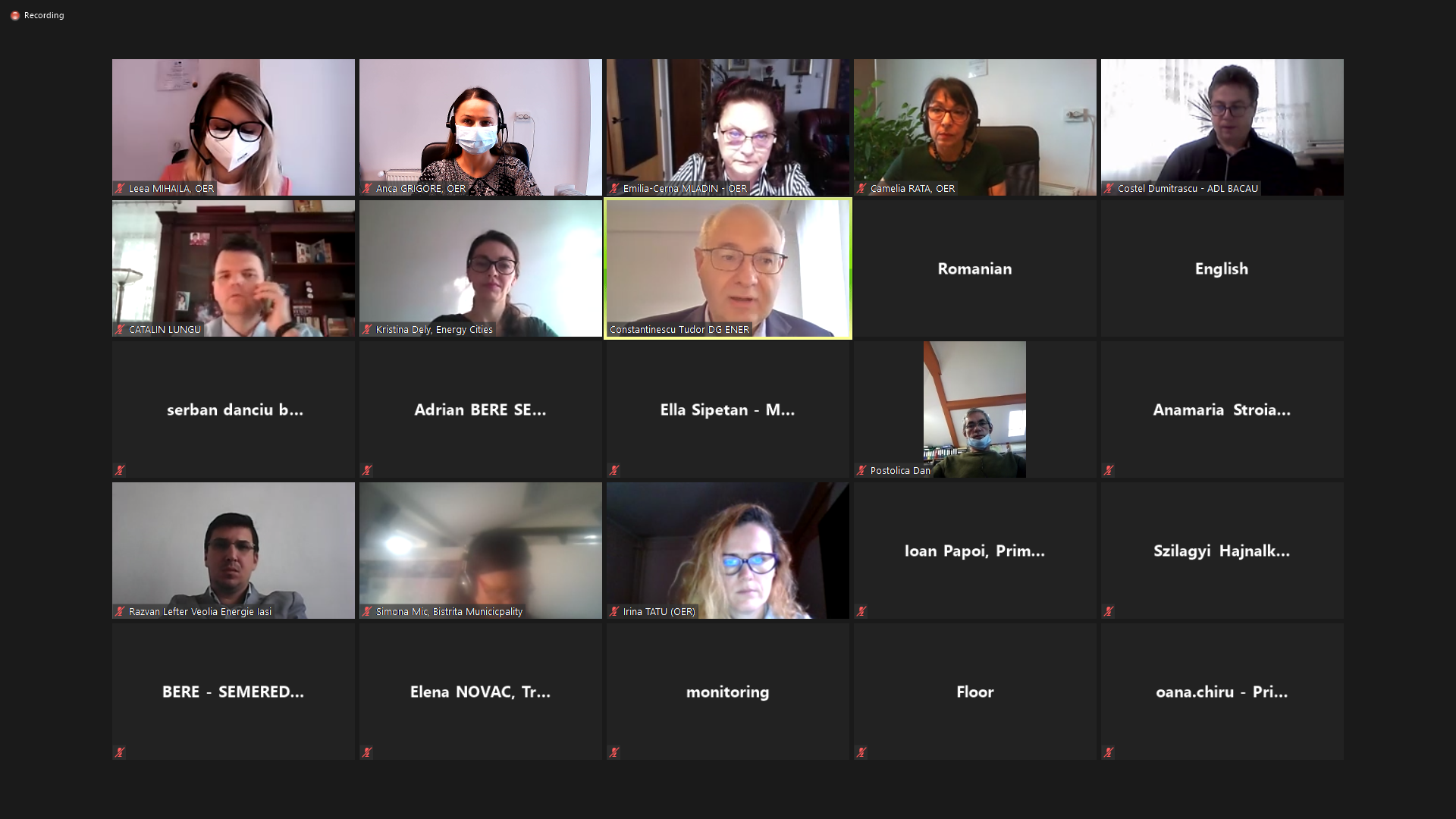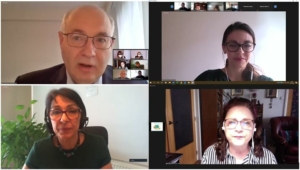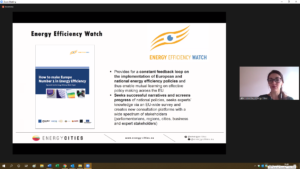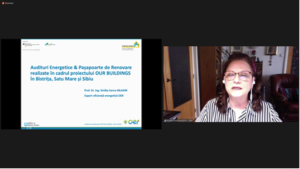Successful national conference in the frame of Our Buildings and Energy Efficiency Watch 4 on municipal renovation strategies
On October 28th, the Romanian Network of Energy Cities (OER) together with the European association of Energy Cities organised a joint conference in the frame of the Our Buildings and the ENERGY EFFICIENCY WATCH 4 project. Due to the ongoing Covid-19 pandemic the meeting took place online which did not impede interesting presentations and fruitful discussion among the 32 participants.

The conference used the timely momentum of the Renovation Wave, the recently published strategic communication by the European Commission which will have large impacts on buildings’ energy consumption in regions and cities. The EC aims to double the annual renovation rate in the next ten years making sure building renovations lead to higher energy and resource efficiency. The Renovation Wave initiative and the context of an ongoing global pandemic represent an unprecedented opportunity to re-think the local ‘business as usual’ scenarios, for harmonising the municipal renovation strategies with the Sustainable Energy and Climate Action Plans, and for reconsidering the sustainability of local communities.
The objective of the conference was built on the project results from the EUKI-funded Our Buildings and the Horizon 2020 project Energy Efficiency Watch 4 to discuss the important role of municipalities in implementing ambitious building renovation strategies and transforming the local building sector.
Deep renovations are implemented on local level
In the beginning of the conference, Mr. Tudor CONSTANTINESCU from the European Commission (DG Energy) set the scene by putting the arising policy and financial opportunities into context of the EU Green Deal and the recently published Energy System Integration strategy as well as the Renovation Wave initiative.

He stressed the importance of digitalisation in the urgent energy transition and the role of municipal authorities to achieve an increasing awareness among building owners and residents to implement deep renovations. Many crucial changes are expected with the revision of central EU directives of the Clean Energy Package in 2021 (Energy Efficiency Directive, Energy Performance of Buildings Directive, Renewable Energy Directive) such as an introduction of minimum energy performance standards in existing buildings and a new generation of Energy Performance Standards set to transform the speed and quality of renovation measures.
The EU Recovery and Resilience Facility, the central instrument of the EU Recovery Plan, offers a huge opportunity to channel investment towards building energy efficiency and climate mitigation projects creating jobs at local level. Romania has to make huge investments in the following two years making use of the mobilised EU budget and recovery funding with approx. 500 mio. m² floor area to be renovated. The achieve this, a close cooperation between national and local governments is crucial to plan and carry out integrated renovation projects and to support an increasing electrification of the energy system through heat pumps as well as waste energy, all with a special emphasis on vulnerable groups.
One-stop-shops, financing facility and capacity building
The Energy Efficiency Watch project, presented by Kristina DELY from Energy Cities, is an initiative providing constant feedback on the implementation of EU & national energy policies to the EU Commission, seeking successful narratives behind the activities. Building renovation was pointed out as the greatest opportunity to simultaneously reduce Romania’s energy consumption which comes as a majority from heating, while protecting the most vulnerable groups at risk of energy poverty and creating local jobs.

Energy Cities identified district-level renovation plans to strategically link renovation with the systemic energy transition and a large-scale deployment of one-stop-shops for residential buildings’ renovation as key initiatives to make the Renovation Wave a success. Also, a European Renovation Financing Facility to increase cities’ financial renovation power and addressing the skills gap by prioritizing capacity-building at the local level are important aspects to be prioritised according to the organisation.
Camelia RATA presented the objectives of the EUKI project Our Buildings which aims to prepare 5 municipal renovation strategies in Romania and Bulgaria respectively feeding into the national long-term renovation strategies (LTRS) as required by the EPBD (2018/844/EU). A close collaboration and consultation with relevant ministries and central authorities was initiated and established to successfully plan and implement the renovation activities. OER identified key barriers and bottlenecks local authorities face in the renovation process and communicated those – alongside ways to solve them – to the national level.

Further, an online Energy Management System was introduced to support data collection of the building stock and to inform priority renovation actions. Within the Our Buildings frame, OER is currently completing nZEB audits, renovation roadmaps and passports, as well as municipal renovation strategies for each of the 5 pilot cities. OER trains the municipal staff to be able to continue the process of collecting data and developing the energy consumptions database, as a permanent practice within the local administration, for monitoring and evaluating purposes.
It was stressed that municipalities should plan for deep renovation activities including the use of sustainable material and renewable energies which generate long-term results to access the available EU recovery funds.
Building renovation roadmaps and revised EPCs
Complex energy audits are currently conducted by OER’s energy efficiency expert Cerna MLADIN in energy-intensive building in each of the 5 pilot cities, namely Bistrița, Satu Mare, Sibiu, Bacău and Mizil which represent different climatic zones. The Energy Management System and methodology used is still under revision to comply with the newest EU legislation (EPBD 2018/844/EU) and Energy Performance Certificates will be subject to a revised calculation methodology in the future aligned with the nZEB target.

A step-wise renovation passport will be developed for each of the selected buildings adapted to the results of the economic analysis which is monitored and revised towards increasing targets through the Energy Management System which the local authority can access.
The conference was complemented by presentations from the Romanian Chamber of Energy Auditors (REHVA) and the European Investment Bank (EIB) presenting the transposition of the EU policy framework into national law and the role of the EIB as climate bank providing financing for technical assistance respectively.
A subsequent active discussion raised the issue of project aggregation to ease financing of renovation measures with Romania facing regulatory barriers. However, the European City Facility, managed by OER in Romania, offers good funding opportunities for local authorities.
Municipal representatives joint the discussion regarding a lack of a centralised database for Energy Performance Certificates and the related issues in monitoring and quality assurance of energy efficiency measures. All participants agreed on a needed improved collaboration between central and local authorities and the crucial development of an online database to improve the monitoring of EPCs to enable deep, high-quality renovations.
For more information please contact office@oer.ro.
All photos were provided by BPIE.
